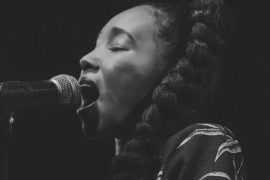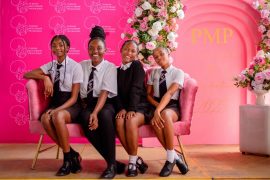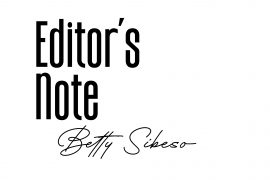Our feminism issue may have been last month but discussion is still rife. Find out what the Director of MISA and proud feminist Natasha Tibinyane had to say about modern feminism.
Are you a feminist?
Proudly so. I was one before I even knew there is a name for it.
What is your definition of feminism?
It’s a diverse movement of people who believe in the equality of the sexes in all spheres of society. It also recognises that patriarchy has and continues to subjugate women and girls. It thus finds ways to rectify the imbalances created and challenge patriarchy.
What are your thoughts on the feminist movement right now?
The global movement is exhilarating, maddening, brilliant, magical, messy, brave, increasingly diverse and so inspiring! It’s all things feminists are. The local movement is fragmented and as a result non-existent.
Is it any different to what it was years ago?
It’s different yet the same in some ways. The internet changed the game. Staying engaged and informed was not as effortless as it is now. Also, the movement had two focus areas, eradicating violence against women and increasing women’s representation in politics. It did ground-breaking work. The civil society space was also very different then. Namibia was still the darling of the international donor community, so funding was not a challenge. Now, funding has practically dried-up. People are facing a lot of personal problems and thus have less strength for that of society. The few who are actively involved are mainly privileged women who work in isolation. We talk a lot and have an event on the appropriate day, but in between not much happens. Social media’s impact on feminism is phenomenal. The amplification of black feminists’ voices is astounding. We’re fearless and call out our fellow white feminists who’ve allowed themselves to be pawns of patriarchy and capitalism. This while marginalising black women’s voices and jealously guarding their privilege and access to resources. Activists (artists who use their work to advocate for a better world) are changing the game, in Windhoek at least. These young creatives are pushing major boundaries and I’m here for it!
What, in essence, do you find wrong with the way women are positioned in the world?
Patriarchy, which is the belief that men are superior to women has ingrained itself in every facet of our lives. They tell us that’s how “God” wants it. At home they tell us keeping and having children with a man is our ultimate role. At work the man reigns supreme. At school they don’t question all the manifestations of patriarchy, while the media perpetuates patriarchy. Globalised monster capitalism has worsened women’s position in the world. Men fly in from Europe to rape our girls. Our girls are put in containers and driven across borders. There’s a whole system that supports this “business”. It’s insane.
What do you think needs to happen before all is well? Do you thinks it’s possible?
My sistah, this is too much to ask, lol!
But seriously, Namibia is one of the few countries in the world that still has Wakanda potential, but we lack the willingness to make it happen. Government needs to play a leading role in bringing about gender equality. It develops the policies, but fails on implementation. Fact is, the very leaders who endorse the policies, don’t support the idea personally. Same goes for the media, which is largely run by men. “Women’s issues” are last on the priority list. We have to recognise that men too are victims of patriarchy, we all are. Many women believe that they are inferior to men, that’s how they were raised and that’s how they raise their children. Dismantling patriarchy and all the tools used to entrench it, mainly religion and capitalism requires everyone to be brave.
This unfortunately will not happen in my lifetime. Maybe hundreds of years from now, some form of Wakanda is possible. But eish, patriarchy, religion and capitalism are so deeply ingrained, I don’t think we’ll ever be truly free.
What are your hopes for the future of women?
Women have to recognise and reclaim our own power. The world will not just give it back to us without a fight. We need to stop believing the countless lies patriarchy tells us every day, all the time. I hope we will awaken the dimmed light within us. I hope we will get over the silly fights we have among ourselves to form a global army of feminist warriors of light. What I find most exciting in the movement now, is the realisation that our interventions must be inter-sectional. The feminist movement has always been flexible, hence our inclusion of LGBTIQ issues in our advocacy.
There are many societal challenges, we have to overcome them and leave no-one behind.
What would you say to every baby girl born today, if they could understand you?
Planet Earth is a mean place. Humanity will break you down instead of build you up. Be self-aware, #KnowThyself. Stay true to yourself, there’s a reason why you are who you are. Find beauty, light and joy wherever and whenever you can, it’s fast diminishing in this around here. Love FEARLESSLY, but start with yourself. Read and learn as much as you possibly can, and travel, start with your own country. If you understand yourself and the world you live in, the battle is halfway won.
How do you empower women in your own capacity?
I’m blessed to have a career that allows me to fully live my feminism. Whatever work I do usually is from a feminist perspective. In that way, I raise awareness among women and men. I also mentor young women. Some approach me, but it’s mostly young women I work with. The mentoring mainly consist of occasional phone calls and emails. I share my experiences and thoughts on whatever the issue of the day is. I also provide them access to my vast network of resource people. Most importantly, I constantly remind them that they’re phenomenal. I’m proud to say that most of the girls and young women I’ve worked with throughout my career are fulfilling their career goals.
Talk to us about your time at Sister Namibia, how was that like?
I became aware of it when in high school through the Sister Namibia Magazine. I visited their resource and found an oasis. I also met the most amazing Namibian women there. Nepeti Nicanor, Rosa Namises, Elizabeth Khaxas & Otilie Abrahams. I also enjoyed meeting international visitors. The movement was small, yet vibrant. I started working there during my student holidays and on completion started working there as a Media Officer. My first feminist project was a girls’ creative writing club I started there. My time at Sister Namibia empowered and emancipated me.
But this was preceded by three years as a reporter at New Era (LOVED IT) and working as a receptionist at a hotel before that. I have to add that I’ve been active in youth groups or empowerment initiatives since primary school. I’ve always loved being a part of a collective that works towards the common good.
What’s the importance of platforms like these (Sister Namibia)?
It’s critically important. My journey as a Namibian woman would not have been the way it is without the knowledge, skills and network that I gained there. We need spaces where we can learn, share and be vulnerable with each other as women. So do men. This life is not easy, we need spaces where we build our capacity to take it on and be the best we can be. The internet has made it so much easier for the young feminist. There’s so much information to access and people to connect with. I love meeting African feminists I follow online.
The theme for this year’s International Women’s Day was #PressForProgress, what specifically are you advocating for?
I continue to advocate for a society in which women and children are free from violence in all its forms. We need to find a way to convince men to get involved. Unfortunately patriarchy has stereotyped feminists as man-hating women who want to take over power, which alienates a lot of men and women. I know women who are feminist, but shy away from claiming it because of the negative stereotypes attached.
We need to change the narrative. Violence affects us all in so many ways. Our women and children deserve lives of dignity & peace.
Follow Natasha on Twitter | @AfroFemVoice




